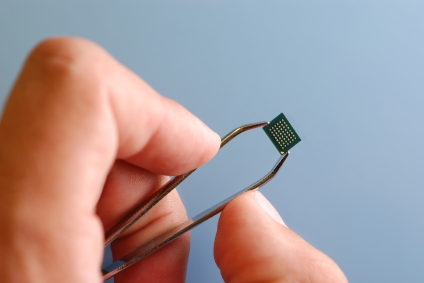– Contributed content –
14 June 2018. No, we’re not talking about potato chips. First invented in 1958 by electrical engineer Jack Kilby, the chip was the first truly integrated electrical circuit. Subsequent copies have been scaled down and made more intricate until the microchip’s invention in 1989. Chips have since gone onto play a major role in our lives. They’re in our debit cards, our mobile phones, our computers and TVs. Chips are everywhere.
The first chip was hand-built. Today’s examples are so complex and intricate that only other computers can manufacture them. Once built, chips need to be thoroughly tested for defects using a wafer inspection system and other testing procedures – procedures that are also reliant on computers.
But chips are still evolving and are getting more complex. In fact, the chips of the future could be a very different breed altogether achieving things we never thought possible.
Enter ‘the quantum chip’
Until recently, computers have operated solely using 1s and 0s. This means that as fast as modern computers are, they’re still doing things in single steps. Quantum computers using quantum chips are thought to be the future and could be capable of achieving many thousands of calculations in a single step. It is thought such computers could discover new chemical formulae and make calculations about the universe that weren’t previously possible.
Experts have stated that quantum computers won’t be useful until they can achieve over 49 quantum bits (the measurement of how many calculations they can do in a step). Well, IBM managed to break that late last year with a chip containing 50 quantum bits, whilst Google have more recently surpassed even that figure with a chip called the Bristletone quantum chip containing a whopping 72 quantum bits. We could be about to finally see the superior capabilities of a quantum computer, which could revolutionize everything we know about the world.
Meanwhile, other chips are being built to mimic the human brain
If this wasn’t scary enough, researchers at the Massachusetts Institute of Technology have been creating chips based on the human brain. Using light beams that act as neurons, the aim is to create a chip that can learn and make decisions at a faster rate than regular computer chips almost to the same ability as a human. The chip has yet to beat regular computer chips but is coming close – in a test used to recognize vowel sounds used by human being speaking, regular chips have a 90% success rate whilst this new chip had a success rate of 77%. Scientists in the experiment believe it won’t be long before these brain-chips outperform regular chips. Could this be the start of artificial intelligence?
Chips are also being implanted inside the human body
Volunteers in Melbourne meanwhile have had microchips placed under their skin as part of a new experiment. The purpose is to measure how human beings cope with chips inside them and whether the human body tries to reject them or gets infected. If successful, chips in the human body could be used to replace debit cards as a form of payment, we could unlock our cars simply using our hand and the chips could even be used to detect early signs illness in the human body. Such chips would have to be secure from hacking, which is something studies are still exploring. Are human beings likely to embrace these cybernetic enhancements, or is it all a bit too invasive? We will soon know.
* * *


 RSS - Posts
RSS - Posts
You must be logged in to post a comment.